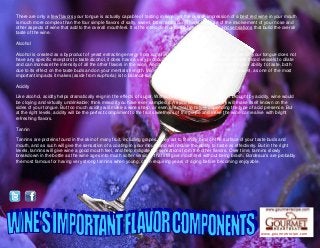
Wine's important flavor components
- 1. www.gourmetrecipe.com There are only a few flavors your tongue is actually capable of tasting in wine, yet the overall impression of a best red wine in your mouth is much more complex than the four simple flavors of salty, sweet, bitter, and sour. This is because of the involvement of your nose and other aspects of wine that add to the overall mouthfeel. It is the interaction of these flavors, aromas, and sensations that build the overall taste of the wine. Alcohol Alcohol is created as a byproduct of yeast extracting energy from sugar in an environment devoid of oxygen. While your tongue does not have any specific receptors to taste alcohol, it does have a very pronounced effect on the mouth. Alcohol causes blood vessels to dilate and can increase the intensity of all the other flavors in the wine. And after a few samples it can also degrade your ability to taste, both due to its effect on the taste buds and on your mental strength. Wine without alcohol is almost always overly sweet, as one of the most important impacts it makes (aside from euphoria) is to balance sugars. Acidity Like alcohol, acidity helps dramatically reign in the effects of sugar. Without some balance of sour flavors brought by acidity, wine would be cloying and virtually undrinkable; think mead if you have ever sampled it. As you taste a wine acidity will make itself known on the sides of your tongue. But too much acidity will make a wine sharp, or even chemical in nature depending the type of acid presence. But at the right levels, acidity will be the perfect compliment to the fruit sweetness of the grape and make the wine come alive with bright refreshing flavors. Tannin Tannins are proteins found in the skin of many fruit, including grapes. They act to literally bind on the surface of your taste buds and mouth, and as such will give the sensation of a coating in your mouth and will reduce the ability to taste as effectively. But in the right levels, tannins will give wine a good mouth feel, and help mitigate the sensations from the other flavors. Over time, tannins slowly breakdown in the bottle as the wine ages into much softer versions that still give mouthfeel without being brash. Bordeaux's are probably the most famous for having very strong tannins when young, often requiring years of aging before becoming enjoyable. v
